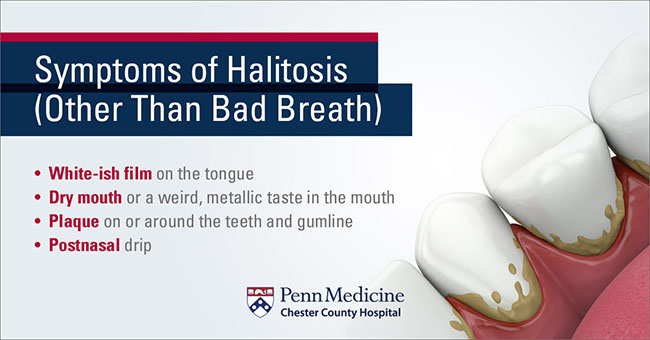
You're running late in the morning and leave the house in a rush. You drink your coffee and talk to a few coworkers, but it isn't until halfway through the day that you realize you forgot to brush your teeth and your breath smells kind of funky.
An estimated 31.8% of adults and adolescents have halitosis (bad breath), and it can have many different causes. This kind of bad breath can probably be fixed easily with a mint or a piece of gum, but you might be surprised by the other reasons your breath might smell.
Bad breath isn’t just another annoying aspect of your body, but it can be a symptom of other health concerns. Here are four things your bad breath might be trying to tell you about your health.
1. You Need to Brush and Floss Your Teeth
Bad breath/halitosis is a common condition that affects nearly 1 in 3 adults. While it can have multiple causes and be a sign of other health issues, bad breath is commonly caused by pieces of food that remain in your mouth — making it a great spot for both odors and bacteria to grow.

Taking time to take care of your teeth can help you tackle bad breath and leave your mouth feeling fresh. You should brush your teeth twice a day for two minutes each to keep bad breath at bay and to promote healthy teeth in general.
But brushing your teeth isn't the only way to combat bad breath. Flossing regularly can also help get rid of the food particles in your mouth (and the ones that get stuck between your teeth). Some oral rinses can also help reduce bad breath — look for products approved by the American Dental Association.
You may also be surprised to learn that studies show brushing your tongue can help reduce bacteria — and the effects of bad breath. You might think your oral health routine isn't that important, but it can have a huge impact not only on the smell of your breath but the health of your teeth. And (spoiler alert), it can also improve other aspects of your health.
2. Time to Quit Smoking
Other habits and lifestyle choices can also affect your breath. Smoking, for example, can not only leave you with a temporary stale smell, it can also be the cause of more consistent bad breath.
Smokers are more likely to develop halitosis, as well as other oral health issues like gum disease, tooth loss and yellowing teeth. You may not notice the smell of your breath because you've slowly gotten used to it. It can be embarrassing if someone else mentions it, but it might be a wake-up call that it’s time to quit smoking.
While it may not be easy to stop smoking cigarettes, the benefits for your oral and overall health make the challenge worth it. And you don’t have to do it by yourself. Chester County Hospital supports people who want to quit smoking with a 6-week smoking cessation program, Stop Smoking NOW!
3. Check on Your Heart Health
While you may think of your body as many separate parts, sometimes what's happening in one part of your body is actually connected to what's happening in another part of your body. Your bad breath, for example, can be tied to your heart health.
While bad breath doesn't cause heart disease, there is some connection between your oral health and your heart health. Bad breath is typically caused by bacteria in your mouth — and experts believe bacteria can travel throughout your body (like from your mouth/gums and into your bloodstream) leading to a higher risk of inflammation or infection.
It's not that your breath is going to smell totally different if you're about to have a heart attack. Bad breath isn't a cause of heart events, there's just a potential connection between gum disease and heart disease to keep an eye on.
If you have bad breath often or notice a weird taste in your mouth, talk to your provider about your heart health. Based on your family medical history, personal medical history, and other lifestyle factors, your provider might order some tests to better understand what's happening.
It’s Time to Talk to Your Dentist
Bad breath can seem like an embarrassing topic to talk about, and it can make you feel self-conscious if you’re always thinking about how your breath smells. If you can’t figure out the cause of bad breath on your own, it may be telling you it’s time to talk to your dentist or doctor. To help you better understand your oral health, a dentist will ask you questions about your lifestyle, medicines you’re taking, and brushing habits.
Remember, you don’t need to be embarrassed about talking to a medical expert about your symptoms. When you talk about how your breath smells, you can figure out what might be causing it and take steps to address it.
Don’t let bad breath — or anxiety about your breath — get in the way of improving your health. Make an appointment with your primary care provider or dentist by visiting the Find a Doctor section of our website.